- Home
- Peter Ackroyd
The Clerkenwell Tales Page 2
The Clerkenwell Tales Read online
Page 2
The convent was in uproar. The prioress prostrated herself before the high altar, and remained in silent prayer for several hours; those in her charge crept into the chapter-house where in low voices they debated whether the sins of the community had brought down this visitation. The words whispered were fantasy, fancy, fantastic, phantasma – but others suggested that Sister Clarice was indeed divinely inspired and that her words were true prophecies.
Two evenings after the event in the choir stalls the prioress consulted the nun’s priest, a young Benedictine by the name of John Duckling. He was acquainted with the art of surgery; by his own account, he was acquainted with the art of everything. “We may cut a vein in her forehead against frenzy,” he was explaining to Dame Agnes.
“Not the temples?”
“They are good for the migraine only. The foremost ventricle of the brain, you see, is situate here.” He tapped his own forehead, which was as smooth as any nun’s. “It is the proper home of the imagination which receives things that contain fantasy. Did you know that the brain is white, like the canvas of a painter? Its colour allows it to be stained by reason and understanding.”
“Is it not true that all veins have their beginning in the liver?”
“Of course yes.” He seemed puzzled for a moment. “But we may not cut there. There is too much flesh, ma dame. Too much flesh.”
Dame Agnes smiled. “But we will not find much matter in her brain, John.”
“No indeed. Give the poor sister some toasted bread and wine before the letting. Then cut the vein with a golden instrument. That is the rule. After the blood has been taken wrap her in some blue cloth, and take care that all about her bed is blue also. Make sure that she sleeps on her right side, and that her nightcap has a hole in it through which the vapour may go out.” Instead of remaining with his head bowed, and with his hands hidden in his sleeves, he was pacing up and down the prioress’s chamber.
Agnes was determined to ignore his discourtesy, however, since this was a pressing matter. “And,” she asked him, “if her humours rebel against it?”
“Sage is good for convulsions. Hence the sentence, why should a man die when sage grows in the garden? Give her sage, mixed with the excrements of a sparrow, of a child, and of a dog that eats only bones.”
“I thought of hellebore to cleanse her.”
“Oh no. Hellebore is a bitter and violent herb, so hot and dry that it should only be used warily. Why, I have seen men so heavy after hellebore that they might have been dead.”
Dame Agnes asked these questions because she feared that Sister Clarice would refuse to be letted, and that she would need to be restrained. Any violence would cause clamour and excitement among the younger nuns. But, in fact, Clarice made not the slightest objection. She seemed entirely complaisant about the matter, as if she welcomed the chance of being the object of medical attention. No one in holy orders was permitted to spill blood and so the local leech, Hubert Jonkyns, was called to the convent. He was skilled in all the arts of blood and sat Clarice upon a moveable privy, her legs straddling it, before gently cutting the vein. She did not speak or move, but only smiled when he put the phial up to her forehead; he pressed gently against the vein, and she gazed at him tenderly while letting out a fart whose odour filled the chamber. He patted her on the head when his work was done.
“You may lose some of your remembrance with your blood,” he told her. “Comb your hair each morning with an ivory comb, since nothing recreates the memory more. Walnuts are hurtful to the memory. And so are onions. Avoid them. Do not stay in the house of a red-haired or red-faced person.”
“There is always Sister Idonea,” she said.
The leech did not understand what she meant, and turned to the nun’s priest who was standing in the corner. “Her white neck is the sign of lecherousness,” he whispered. “Did you smell that fart?”
Despite all of Hubert Jonkyns’ precautions, however, Clarice did not sleep well that night. She rose from her bed at the time of lauds and, in the sight of all those who had gathered in the choir, she began to sweep the nave of the church while prophesying the ravishment and ruin of the convent itself. She cried out, also, that all the churches of England would be wrecked and wiped clean.
Rumours of her prophecies soon spread beyond the walls of the convent and into the city where, in the turbulent time of a weak and wretched king, her admonitions were given credence. Some called her the mad nun of Clerkenwell, but many others revered her as the blessed maid of Clerkenwell. The bishop’s exorcist conducted several interviews with her, but he found her distracted and contradictory. “The sweetness of Christ’s Mother has pierced my heart,” she told him on one occasion. “To me she came and bade me to sing, O Alma Redemptoris mater.”
“But Dame Agnes tells me that you dream only of the damned. Or so you said to her.”
“I can no more expound in this matter. I learn my song, but I have small grammar.”
Then she called out for the Redeemer.
At another meeting she had foreseen fire and the sword, but then in the next moment had howled at the prospect of bliss. The exorcist could not fathom her words; his only remedy was to confine her to the convent and on no account allow her to walk abroad.
Three weeks after the sweeping of the church, another extraordinary event was being reported from street to street. The chantress had been heard to scream loudly and repeatedly. When others ran to the chapter-house, where she was standing, they found several nuns lying on the stone floor with their arms outstretched in the shape of the cross; around them was a circle of little wooden and stone images of the Virgin, with a burning candle between each of them. These nuns were intoning, in low voices, the antiphon “Media vita in morte sumus”; the chantress had thought that they were singing “Revelabunt celi iniquitatem ludi,” which was used notoriously as a spell. That was why she had screamed. One nun then rose to her feet, and flung a candle at her curious and terrified sisters; another bit the rushes three times in sign of a curse. It was feared that the entire convent might become possessed, and the prioress ordered that all the offending nuns should be locked in the cellars.
It was on the morning following this unhappy episode that Dame Agnes de Mordaunt had entered the painted chamber with Sister Idonea and had described Clarice as the mother of lies.
“You have caused great grievance here,” she continued. “As if swine had been running among us.”
Clarice looked intently at Agnes’ breasts. “A ring upon a nun is like a ring in a sow’s nose.”
The prioress restrained her impulse to beat the girl about the head. “You slide in your words, Clarice. You slip.”
“No. I am on stony ground.”
“Then pray for deliverance, daughter.”
Whereupon Clarice fell upon her knees. “I pray to Mary, Holy Mother of God, that the five wounds of Her only begotten Son may appear again.”
Agnes looked at her with distaste. She suspected that there was much subtle craft in the young nun’s demeanour, but she could not prove it.
“They will appear in the five wounds of the city when it will be lifted into bliss.”
“You speak from a dark place.”
“There will be five fires and five deaths in London.” Clarice, still upon her knees, then began to sing.
“And when she came to St. Mary’s aisle
Where nuns were wont to pray,
The vespers were sung, the shrine was gone,
And the nuns had passed away.”2
At the earnest entreaty of Dame Agnes the Bishop of London, Robert Braybroke, summoned Clarice to his palace in Aldermanbury. Robert was a cleric who had grown rich upon benefices, a robust and high-coloured man who had a reputation for sudden fits of violent anger. He kept the nun waiting in a small stone chamber beside the great hall where, after an hour, she was brought into his presence. He was dipping his fingers into a bowl of rose water. “Here is the little nun who begets large words. Oh, ma dame, il faut i
nitier le peuple aux mystères de Dieu. Is that your song? Leave us.” The two canons who had brought her quickly left the room. They stood close to the door, in the corridor outside, but they could not hear what was being said – only, at one point, the sound of laughter.
Robert Braybroke had his hand upon her neck when they emerged from this interview. “The wise child waits,” he said to her.
“The wise child knows its own father,” she replied.
“Remember, Clarice, I am your father now.”
Chapter Two
The Friar’s Tale
On a stormy morning, one week after Sister Clarice’s interview with Robert Braybroke, Bishop of London, two figures might have been seen pacing the cloister of St. Bartholomew the Great, the priory church of Smithfield. They were engaged in earnest conversation, and moved quickly from pillar to pillar. One was dressed in the black hood and cloak of an Austin friar; the other wore a loose-fitting garment of patched leather, around which were tied an awl and handsaw as tokens of his trade. There was a third following them, a younger man who walked with his head bowed. An observer might have been puzzled by the fact that he was close behind them, but that they seemed to ignore him. His name was Hamo Fulberd.
Hamo was listening intently to them.
“We must act,” the friar said.
“Why be hasty in this hot fare?” the carpenter replied. “The nun does our work for us.”
“True. She inflames the city.” The friar was silent for a moment. “The incense out of the fire is sweet. But you must act, Marrow. You know what you must do.”
The huge rain wrapped itself around the cloister, and there was a sudden thunder-light in the dark sky. Hamo instinctively looked towards the vaulted roof of the passage, its ribs and arches holding back the power of the stone. In the moist air it smelled of forgotten time, rancid and indignant at its deposition. To the boy it seemed that the friar and the carpenter were imprisoned by stone, enshrined by stone – that endless ages of stone lay above their heads, and that they could only find their way beneath it in subdued voices and with tired gestures. They were crouched beneath the stone, but they might have been kneeling in adoration.3 The stone rose up, defying the rain and wind, sealing with an act of blessedness the earth and sky. What did it matter what they said? I do not wish to look upon grass or upon flowers, Hamo said to himself, I only wish to look upon stone. It is my home. I wish to become stone. If they choose to mock me, or to laugh at me, I will turn my stone face towards them.
“I have told you, Marrow, all the matter concerning the five circles of deliverance.” As he spoke the friar, William Exmewe, uncovered his head; his red hair, now tonsured, had once been rich and abundant. “Five ways, and five times in each way.”
“Turnagain Lane.”
“In the city of God. Five senses. Five wounds.”
They walked for a while in silence along the sides of the court; there was a conduit at its centre, from which all the water of the priory came, and an image of St. Chrysostom stood upon its metal cover in perpetual blessing.
“There are five letters in the name of Jesus. It is the endless knot.”
The carpenter, Richard Marrow, did not reply. It was as if he were afraid, or unwilling, to speak. It was as if he had calculated how many words would lead him through this life, and was determined not to exceed that number. He was tall, with the willed slenderness of the ascetic.
The friar gestured to the light that had once more brought shade and brightness to the cloister. “But now, you see, God has breathed upon us. He is still here.”
The rain had cleared as suddenly as it had descended, and Hamo felt an overwhelming desire to walk out over Smithfield. He had been brought up in the priory. He had been found abandoned in Cock Lane, only a few yards from this place, and was assumed to be the unwanted child of one of the prostitutes who plied their trade in that narrow thoroughfare. He had been left at the gate of St. Bartholomew, and discovered there by the elderly porter who looked after the horses; from that day forward he had known no life other than that of the friars. It was discovered that he was skilled with his hands, and so he was trained as an illuminator in the scriptorium. He prepared the inks and the paints; he smoothed the parchments and drew lines upon them with rule and charcoal pencil. He learned to mix black and red, white and yellow. Then he was trained in the art of drawing outlines with a brush of squirrel hair. He was taught how to plaster the walls of the church in preparation for the murals; he would cover them with lime putty, rendered damp for the better retention of colour. He had worked first on the smaller paintings on these walls, known to the friars as Biblia pauperum or poor man’s Bible. In the chancel, for example, he had drawn the outline of Longinus piercing the body of the crucified Christ with a lance. The left hand of Longinus was pointing towards his face, as a token that he had miraculously recovered his sight. Over the years Hamo had learned the secrets of his art. The open palm denoted judgement; the upraised or pointed finger was the token of condemnation. The curved finger was the symbol of speech, while raised hands signified argument or exposition. The hands and arms spread out could be interpreted as wonder or adoration. Crossed legs were a sign of unnaturalness; that is why, in the mysteries, Herod was played in that position. The soul was always depicted as a small and naked figure, sometimes wearing a crown or a mitre. He painted all of these with red and yellow ochre, with lime white and lamp black, with green and lapis lazuli.
He was known to the others as “simple Hamo” or as “silent Hamo.” He took part in the rituals of the community by rote, without conviction of any kind. He did not consider himself part of the friars’ common life or fervent faith. From infancy, he had been a natural exile. When he suffered sorrow or fear, he did not consider it. This was the way of the world. Someone else might have pitied him, but he did not pity himself. He was familiar with loneliness. He was accustomed to long endurance. If he had experienced any strong feeling he would have dismissed it, since he had no one with whom he could share it. Yet over these years, he had attached himself to William Exmewe. He had begun following the young friar from a distance, staying just out of sight, but Exmewe had noticed him. He called out to Hamo one evening as he came from the refectory; the boy had been waiting for him by the corner of the building.
“What is this? Follow the leader?” Hamo looked up at him silently and intently. “What do you call yourself?” Exmewe knew his name, of course, but was determined to make him speak. He took him by the shoulders, and shook him roughly. “Do you have a tongue to use? Would it be Hamo Fulberd?” The boy nodded. “Fulberd and yet beardless, I see.” St.ill the boy said nothing. “You are like wood. God forbid that you be carved from a wicked tree.” But then Exmewe, perhaps recalling the circumstances of Hamo’s adoption, relented. “Well, Fulberd, walk in the open way ever after. Where I may see you.”
So Hamo stayed in Exmewe’s company. The other friars debated among themselves the nature of his temperament and the precise mixture of his humours. Some deemed the boy to be melancholic, therefore slow and pensive, while others believed him to possess the chaste and sad piteousness of the phlegmatic. The connection between the two was impossible to fathom except that, in some obscure fashion, Hamo Fulberd had found a father.
Now that the rain had cleared, Exmewe opened the wicket gate of the priory and walked out into Smithfield. It was not market day but the open space was churned up by horses and carts and wagons of every description; pigs were rooting among the rubbish, and black kites wandered among discarded bones as if they were in mourning for London itself. The name of God was all around them – “God save you,” “God’s speed,” “God give you grace” – muttered casually and under the breath, or cried aloud in greeting, like some susurrus of benevolence from the divine world. The smell of slaughtered animals, coming from the shambles, mingled with human scents as they passed the Broken Seld, the Bell on the Hoop, the Saresinshed, and the Cardinal’s Hat.
“Filled with priests,” Exmewe o
bserved as he peered into the basement of the Hat. “They transubstantiate the wine into nothing.” Above the ground-floor door of this hostelry was a sign of welcome vividly painted on a wooden panel; it displayed the image of a man entering a bed where someone else was already sleeping. “They say that March is burial month. I could fill a graveyard with these Rome-runners and chop-churches.”
“They are the beads of the devil’s rosary.” Richard Marrow knew the litany of contempt.
“They are the kin of Cain. The children of Judas singing from the prayer book of hell.”
Just then a loud argument broke out, with the cries of “Havoc!” and “Heads! Heads!” Mixed with them were the noises of the animals in a muddy yard beside the tavern, roped together and constrained by oaths and blows; Hamo could not endure the sound of horses and cattle being lashed, pummelled by fists, whipped by laughing children. It broke open for him all sense of order. He would rather have stripped himself bare and gone into the middle of Smithfield as a sacrifice. Instead he put his hands to his ears and let out a low insistent moan. All the woes of this world seemed to enter him.
Exmewe hit him upon the head. “You will mar us all. Depend upon it.”
On no account did Exmewe wish to draw attention to himself. Swiftly he led them into Duck Lane, a narrow and confined thoroughfare paved with cobbles and oyster shells, with a row of open arches down its west side; there was a bench across the lower part of each arch, with variously coloured cloths and tapestries piled in profusion. Richard Marrow looked upon their rich colours and textures with disfavour. “When the fire falls,” he muttered to Exmewe, “all this will burn to blue ashes.”

 The Clerkenwell Tales
The Clerkenwell Tales The Canterbury Tales
The Canterbury Tales J. M. W. Turner
J. M. W. Turner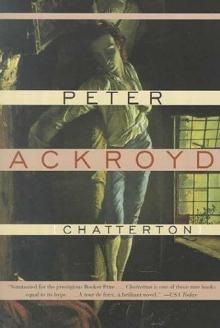 Chatterton
Chatterton The Canterbury Tales – A Retelling
The Canterbury Tales – A Retelling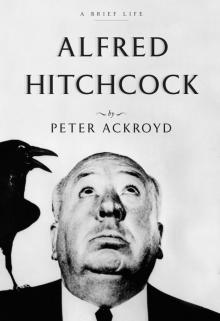 Alfred Hitchcock
Alfred Hitchcock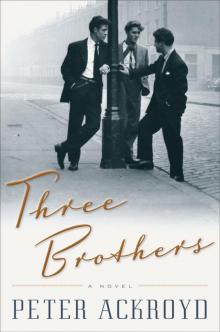 Three Brothers
Three Brothers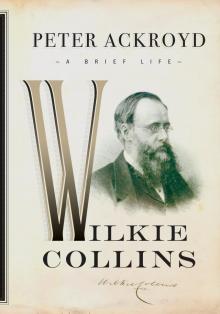 Wilkie Collins
Wilkie Collins Venice
Venice Poe
Poe The Lambs of London
The Lambs of London London
London Queer City
Queer City Revolution, a History of England, Volume 4
Revolution, a History of England, Volume 4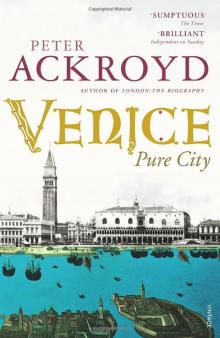 Venice: Pure City
Venice: Pure City Foundation
Foundation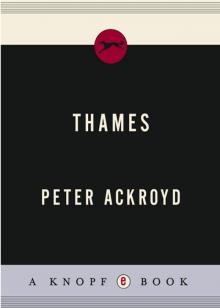 Thames
Thames The Plato Papers
The Plato Papers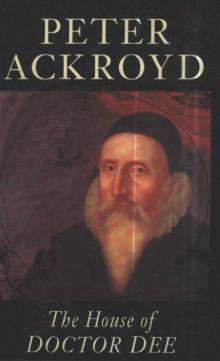 The house of Doctor Dee
The house of Doctor Dee Rebellion: The History of England from James I to the Glorious Revolution
Rebellion: The History of England from James I to the Glorious Revolution Albion: The Origins of the English Imagination
Albion: The Origins of the English Imagination The Fall of Troy
The Fall of Troy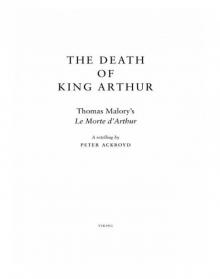 The Death of King Arthur
The Death of King Arthur The Trial of Elizabeth Cree
The Trial of Elizabeth Cree London: The Biography
London: The Biography The Casebook of Victor Frankenstein
The Casebook of Victor Frankenstein Hawksmoor
Hawksmoor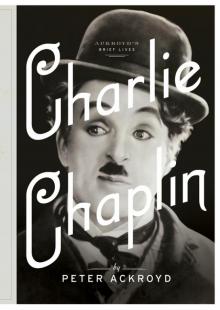 Charlie Chaplin
Charlie Chaplin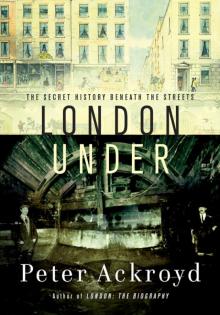 London Under
London Under